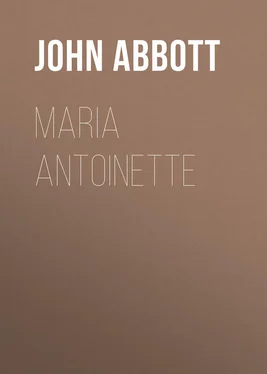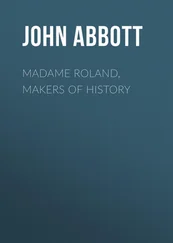John Abbott - Maria Antoinette
Здесь есть возможность читать онлайн «John Abbott - Maria Antoinette» — ознакомительный отрывок электронной книги совершенно бесплатно, а после прочтения отрывка купить полную версию. В некоторых случаях можно слушать аудио, скачать через торрент в формате fb2 и присутствует краткое содержание. Жанр: foreign_antique, foreign_prose, Историческая проза, на английском языке. Описание произведения, (предисловие) а так же отзывы посетителей доступны на портале библиотеки ЛибКат.
- Название:Maria Antoinette
- Автор:
- Жанр:
- Год:неизвестен
- ISBN:нет данных
- Рейтинг книги:5 / 5. Голосов: 1
-
Избранное:Добавить в избранное
- Отзывы:
-
Ваша оценка:
- 100
- 1
- 2
- 3
- 4
- 5
Maria Antoinette: краткое содержание, описание и аннотация
Предлагаем к чтению аннотацию, описание, краткое содержание или предисловие (зависит от того, что написал сам автор книги «Maria Antoinette»). Если вы не нашли необходимую информацию о книге — напишите в комментариях, мы постараемся отыскать её.
Maria Antoinette — читать онлайн ознакомительный отрывок
Ниже представлен текст книги, разбитый по страницам. Система сохранения места последней прочитанной страницы, позволяет с удобством читать онлайн бесплатно книгу «Maria Antoinette», без необходимости каждый раз заново искать на чём Вы остановились. Поставьте закладку, и сможете в любой момент перейти на страницу, на которой закончили чтение.
Интервал:
Закладка:
This gorgeous mansion of the monarchs of France presents a front eight hundred feet in length, and has connected with it fifteen projecting buildings of spacious dimensions, decorated with Ionic columns and pilasters, constituting almost a city in itself. One great gallery, adorned with statuary, paintings, and architectural embellishments, is two hundred and thirty-two feet long, thirty broad, and thirty-seven high, and lighted by seventeen large windows. Many gorgeous saloons, furnished with the most costly splendor, a banqueting-room of the most spacious dimensions, where luxurious kings have long rioted in midnight revels, an opera house and a chapel, whose beautifully fluted pillars support a dome which is the admiration of all who look up upon its graceful beauty, combine to lend attractions to these royal abodes such as few other earthly mansions can rival, and none, perhaps, eclipse. The gardens, in the midst of which this voluptuous residence reposes, are equal in splendor to the palace they are intended to adorn. Here the kings of France had rioted in boundless profusion, and every conceivable appliance of pleasure was collected in these abodes, from which all thoughts of retribution were studiously excluded. The expense incurred in rearing and embellishing this princely structure has amounted to uncounted millions. But we must not forget that these millions were wrested from the toiling multitude, who dwelt in mud hovels, and ate the coarsest food, that their proud and licentious rulers might be "clothed in purple and fine linen, and fare sumptuously every day." Such was the home to which the beautiful Maria Antoinette, the bride of fifteen, was introduced; and in the midst of temptations to which such voluptuousness exposed her, she entered upon her dark and gloomy career. This, however, was but one of her abodes. It was but one even of her country seats. At Versailles there were other palaces, in the construction and the embellishment of which the revenues of the kingdom had been lavished and in whose luxurious chambers all the laws of God had been openly set at defiance by those earthly kings who ever forgot that there was one enthroned above them as the King of kings.
Within the circuit of the park are two smaller palaces, called the Great and the Little Trianon. These may be called royal residences in miniature; seats to which the king and queen retired when desirous of laying aside their rank and state. The Little Trianon was a beautiful palace, about eighty feet square. It was built by Louis XV. for Madame du Barri. Its architectural style was that of a Roman pavilion, and it was surrounded with gardens ornamented in the highest attainments of French and English art, diversified with temples, cottages, and cascades. This was the favorite retreat of Maria Antoinette. This she regarded as peculiarly her home. Here she was for a time comparatively happy. Though living in the midst of all the jealousies, and intrigues, and bickerings of a court, and though in heart deeply pained by the strange indifference and neglect which her husband manifested toward her person, the buoyancy of her youthful spirit enabled her to triumph, in a manner, over those influences of depression, and she was the life and the ornament of every gay scene. As her mind had been but little cultivated, she had but few resources within herself to dispel that ennui which is the great foe of the votaries of fashion; and, unconscious of any other sources of enjoyment, she plunged with all the zest of novelty into an incessant round of balls, operas, theaters, and masquerades. Her mind, by nature, was one of the noblest texture, and by suitable culture might have exulted in the appreciation of all that is beautiful and sublime in the world of nature and in the realms of thought. She loved the retirement of the Little Trianon. She loved, in the comparative quietude of that miniature palace, of that royal home, to shake off all the restraints of regal state, and to live with a few choice friends in the freedom of a private lady. Unattended she rambled among the flowers of the garden; and in the bright moonlight, leaning upon the arm of a female friend, she forgot, as she gazed upon the moon, and the stars, and all the somber glories of the night, that she was a queen, and rejoiced in those emotions common to every ennobled spirit. Here she often lingered in the midst of congenial joys, till the murmurs of courtiers drew her away to the more exciting, but far less satisfying scenes of fashionable pleasure. She often lamented bitterly, and even with tears, her want of intellectual cultivation, and so painfully felt her inferiority when in the society of ladies of intelligence and highly-disciplined minds, that she sought to surround herself with those whose tastes were no more intellectual than her own. "What a resource," she once exclaimed, "amid the casualties of life, is a well-cultivated mind! One can then be one's own companion, and find society in one's own thoughts." Here, in her Little Trianon, she made several unavailing attempts to retrieve, by study, those hours of childhood which had been lost. But it was too late. For a few days, with great zeal and self-denial, she would persevere in secluding herself in the library with her books. But it was in vain for the Queen of France to strive again to become a school-girl. Those days had passed forever. The innumerable interruptions of her station frustrated all her endeavors, and she was compelled to abandon the attempt in sorrow and despair. We know not upon how trivial events the great destinies of the world are suspended; and had the Queen of France possessed a highly-disciplined mind – had she been familiar with the teachings of history, and been capable of inspiring respect by her intellectual attainments, it is far from impossible that she might have lived and died in peace. But almost the only hours of enjoyment which shone upon Maria while Queen of France, was when she forgot that she was a queen, and, like a village maiden, loitered through the gardens and the groves in the midst of which the Little Trianon was embowered.
The enemies of Maria had sedulously endeavored to spread the report through France that she was still in heart an Austrian; that she loved only the country she had left, and that she had no affection for the country over which she was to reign as queen. They falsely and malignantly spread the report that she had changed the name of Little Trianon into Little Vienna. The rumor spread rapidly. It excited great displeasure. The indignant denials of Maria were disregarded. Thus the number of her enemies was steadily increasing.
Another unfortunate occurrence took place, which rendered her still more unpopular at court. Her brother Maximilian, a vain and foolish young man, made a visit to his sister at the court of Versailles, not traveling in his own proper rank, but under an assumed name. It was quite common with princes of the blood-royal, for various reasons, thus to travel. The young Austrian prince insisted that the first visit was due to him from the princes of the royal family in France. They, on the contrary insisted that, as he was not traveling in his own name, and in the recognition of his own proper rank, it was their duty to regard him as of the character he had assumed, and as this was of a rank inferior to that of a royal prince, it could not be their duty to pay the first visit. The dispute ran high. Maria, seconded by the Abbé Vermond, took the part of her brother. This greatly offended many of the highest nobility of the realm. It became a family quarrel of great bitterness. A thousand tongues were busy whispering malicious accusations against Maria. Ribald songs to sully her name were hawked through the streets. Care began to press heavily upon the brow of the dauphiness, and sorrow to spread its pallor over her cheek. Her high spirit could not brook the humility of endeavoring the refutation of the calumnies urged against her. Still, she was too sensitive not to feel them often with the intensest anguish. Her husband was comparatively a stranger to her. He bowed to her with much civility when they met, but never addressed her with a word or gesture of tenderness, or manifested the least desire to see her alone. One evening, when walking in the garden of Little Trianon, he astonished the courtiers, and almost overpowered Maria with delightful emotions, by offering her his arm. This was the most affectionate act with which he had ever approached her. Such were the bridal days of Maria Antoinette.
Читать дальшеИнтервал:
Закладка:
Похожие книги на «Maria Antoinette»
Представляем Вашему вниманию похожие книги на «Maria Antoinette» списком для выбора. Мы отобрали схожую по названию и смыслу литературу в надежде предоставить читателям больше вариантов отыскать новые, интересные, ещё непрочитанные произведения.
Обсуждение, отзывы о книге «Maria Antoinette» и просто собственные мнения читателей. Оставьте ваши комментарии, напишите, что Вы думаете о произведении, его смысле или главных героях. Укажите что конкретно понравилось, а что нет, и почему Вы так считаете.












